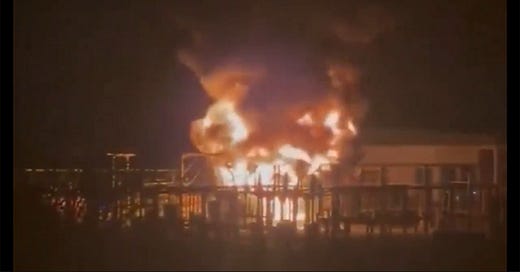Heathrow Fire Reveals Vulnerabilities
Europe is experiencing a growing number of incidents caused by suspected sabotage actions. Russia is believed to be behind in many cases, an intelligence services warn that they are preparing for war
Heathrow Airport, the busiest airport in Europe, was completely shut down because of a fire at an electricity transformer substation on the night of 20 March. The fire at the North Hyde substation in Hayes, about 1.5 miles from Heathrow in west London, seriously disrupted the area’s power supply. Because this particular station supplies both the area in general and the airport, the power interruption affected the airport so seriously that it had to be closed completely for traffic.
From a bystander’s video of the substation fire. Still from video on X.
The closure ended up lasting 18 hours, causing chaos, leaving thousands of passengers stranded. More than 1,300 flights were affected, with about 120 of those already in the air. Interrupting a major hub like Heathrow inevitably has repercussions for the whole network in Europe and overseas.
UK and the rest of Europe already has a strengthened focus on security and preparedness for disruptions of public services, accidental or caused by deliberate actions. It became part of the huge defense package that the EU Council agreed on two weeks ago (link).
The British Prime Minister Starmer told the BBC ‘there are questions’ for bosses of the UK's largest airport to answer over the 18-hour long closure on Friday, which disrupted the journeys of some 200,000 passengers. Heathrow management defended their decision to shut down following claims that it did have enough power to operate after the substation fire. The airport said it had to ground flights due to the time it took to switch from the damaged substation to two alternative power supplies, but added ‘lessons can and will be learned’.
The impact this fire in single power source has raised questions over Heathrow's resilience and disaster plans, considering the airport has thousands of passengers and millions of pounds worth of trade pass through its four terminals on a daily basis.
Experts immediately pointed out that such important infrastructure must have contingency measures in place to assure continuous operation in case of failure of any single important component of the service. Important structures such as hospitals, utilities and data centers always have a requirement for continuous operation, and the same should go for major airport facilities. However, Heathrow appears not to have redundancy of power sources, so that if one fails, another can take over. Preferably in a seamless way, automatically.
Technical solutions are available and the usage is commonplace when required. But European officials are worried that this may not be the case and also that the alertness and sense of urgency is not present as needed in these times of unrest.
Russia
While UK authorities have declared that the Heathrow incident is unlikely to have been caused by outside intervention like sabotage, it might as well have been. There is by now a long list of sabotage actions and plans that European authorities are convinced must be caused by direct or indirect Russian interference.
The Baltic Sea is beridden by cable, pipeline, infrastructure damages that after many months led to NATO forming the Baltic Sentry surveillance and prevention force in the area. It seems that the activity has somewhat slowed down after that, but it is too early to declare full success. See some of the many posts on submarine interference in the Baltic Sea:
The worst incident on land, so far, is the Russian plot to assassinate the CEO of the German weapons manufacturer Rheinmetall, Armin Papperger. Politico Europe announced that NATO has now confirmed the plot and they find it is proven that Russia is trying to establish a full scale terror campaign against European countries.
The plot, which was foiled by United States and German intelligence, was part of a series of Russian plans to assassinate defense industry executives across Europe, according to NATO Deputy Assistant Secretary-General for Innovation, Hybrid, and Cyber James Appathurai.
It is the first time a senior NATO, German or American official has confirmed on the record that there was a plot to kill Papperger, which was widely reported on by global media outlets in July 2024.
The NATO official told the EU Parliament subcommittee on hybrid warfare that acts of sabotage have been seen across NATO countries for years, such as derailment of trains, acts of arson, attacks on politicians’ property, plots to assassinate industry leaders, not only like that concerning the head of Rheinmetall, but other, not public domain plots as well. Infrastructure on land has also been targeted.
According to Appathurai, the Russians recruit personnel for their plots online, using “criminal gangs or unwitting youth or migrants” to carry out the criminal acts.
Warnings from security services
German security officials believe the Kremlin is laying the groundwork for a potential large-scale conventional war with NATO by the end of the decade, according to multiple reports cited by European Pravda and Bild. This warning comes from an assessment jointly produced by Germany’s Federal Intelligence Service (BND) and the Bundeswehr. Russia increasingly views the West as a ‘systemic enemy’ and is rebuilding its military capacity with long-term confrontation in mind.
Bild, Süddeutsche Zeitung and national German TV channels cite the reports, noting that Putin appears intent on testing NATO’s Article 5 guarantees. That is the often mentioned ‘Musketeer Oath’ that obliges member countries to come to the defense of others, if they are attacked. Once Russia’s war in Ukraine is over or there is a lasting ceasefire, Putin may seek to challenge how seriously that commitment would be honored.
According to Bild,
Putin prepares for large scale war. Gloomy predictions from our intelligence services. Russia is preparing for an attack on NATO – but the invasion of Ukraine isn't weakening Kremlin dictator Putin's war economy!
The new assessment by the German Federal Intelligence Service (BND) and the Bundeswehr concludes that Russia sees itself in a systemic conflict with the West. Putin's empire is prepared to pursue its imperialist goals with military force.
While German authorities caution that Russia is not yet capable of waging a full-scale war against NATO in the near term, Lithuania’s State Security Department (VSD) added that limited Russian military action against one or more NATO states is within the realm of possibility. NATO Secretary General Mark Rutte has recently reiterated the alliance’s red lines, promising a ‘devastating response’ to any Russian attack on member nations such as Poland or others.
Select posts on this subject - find many more in the blog archive










The democratic world, multilateral organizations ( like the UN and NATO) the post WWI global trade system and our human rights are are being attacked by a loosely organized cabal of digitally sophisticated autocracies including Russia, China, Saudi Arabia, Hungary, and the United States which are supported by the 1% of the world's population that own 43% of the world's assets. This cabal wants to divide the world into zones of power, eliminate the constraints of human rights, environmental and safety regulations and avoid taxes on global wealth.
Hybrid warfare is a relatively inexpensive form of offensive warfare, one that is difficult to trace since complex systems are fragile and has relatively little blow back on the aggressor's own population. Modern democracies are particularly vulnerable to this form of warfare because of the ubiquitous and relatively unfettered use of digital technologies in our societies, our commitments to human rights and elections and because we live in complex and interconnected global economies and world, where a break in any one point can cause failures in other systems.
Hybrid warfare is not just sabotage, but includes disinformation campaigns (by manipulating public opinion through fake news, propaganda and social media), economic coercion (leveraging trade dependencies, energy, communications infrastructure, currencies), cyber operations (data theft, digital disinformation, and critical attacks on critical infrastructure), and proxy actions to destabilize countries and regimes (electoral interference, financing "independent" think tanks, assassinations, and covert police actions against overseas activists and critics and, piracy to undermine global trade).
The dangers of hybrid warfare are real, especially because the autocracies in this cabal do not feel bound by traditional rules of war, human rights, or even the rule of law. These autocracies are relatively indifferent to their domestic populations, which they keep in line through repression and fear. But more importantly, hybrid warfare has been successful in converting democracies into autocracies and changing the balance of power. Hybrid warfare conducted by China, Russia and the global techbros (whose companies have more wealth than many countries) toppled the United States. The United States is now the enemy.
Now, with the help of Russia, China and other autocracies, the United States is deploying hybrid warfare to undermine democracies in the EU, Canada, Mexico and Panama as well as the UN and NATO. Unfortunately, the close integration of all these democracies and multilateral organizations with the US has made it difficult to acknowledge that the United States is now the enemy. It has defected and is an autocracy fighting against the rule of law. Our wishes and hopes tto the contrary make us even more vulnerable to hybrid warfare.
Democracies need to harden their hearts and resolve and cut off the economic and defence links with the United States . They need to take coordinated action to limit disinformation perhaps by holding media operations and digital platforms accountable and liable for disinformation communicated on their services. Democracies may need to reclaim control of critical infrastructure to build in redundancy (which may not be economically palatable to profit driven private enterprises) and strengthen economic ties among democracies and freeze out businesses aligned with autocratic regimes. ( I understand that this is a political litmus test for businesses; but I don't think that businesses or corporations should be able to contribute to political campaigns or have political free speech rights. Human rights belong to individuals.)
Democracies need to double down work together to truly address those global problems like climate change and inequality because these global issues give autocracies the fodder for disinformation and unrest. This may mean a global corporate minimum tax, a portion of which should be used exclusively by multilateral organizations addressing global problems. Finally, on the economic front, democracies need to coordinate together to stem global corruption and crime which undermine democracies and human rights. We need to enforce transparency of supply chains to ensure that global environmental laws, human rights and governance standards are adhered to and deficiencies corrected.
Finally, we need to undertake our own campaigns of hybrid economic and information warfare against the autocratic cabal by coordinated economic sanctions to cut off the flow of funds or weapons that might be used against us. We should encourage the brain and resource drain out of autocracies because the world cannot afford to lose knowledge. We need to ensure that history is not forgotten and that we recover what may have been lost. We should welcome those businesses , NGOs and institutions who wish to flee from the autocracies and who agree to abide by our laws and values, because it is better to build on existing expertise and knowledge. We also need to ensure that we encourage discussion, acknowledge mistakes and undertake constant course correction among those residing in our countries and among countries. Democracies and multilateralism are imperfect, messy and difficult to keep...but the alternatives are far worse. So this is a call to arms to fight and to contribute to the discussion.